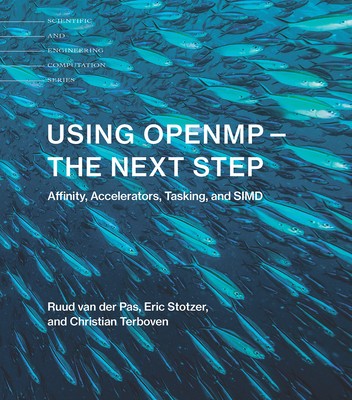
- We will send in 10–14 business days.
- Author: Ruud van der Pas
- Publisher: MIT Press
- ISBN-10: 0262534789
- ISBN-13: 9780262534789
- Format: 20.3 x 22.6 x 2 cm, softcover
- Language: English
- SAVE -10% with code: EXTRA
Reviews
Description
A guide to the most recent, advanced features of the widely used OpenMP parallel programming model, with coverage of major features in OpenMP 4.5.This book offers an up-to-date, practical tutorial on advanced features in the widely used OpenMP parallel programming model. Building on the previous volume, Using OpenMP: Portable Shared Memory Parallel Programming (MIT Press), this book goes beyond the fundamentals to focus on what has been changed and added to OpenMP since the 2.5 specifications. It emphasizes four major and advanced areas: thread affinity (keeping threads close to their data), accelerators (special hardware to speed up certain operations), tasking (to parallelize algorithms with a less regular execution flow), and SIMD (hardware assisted operations on vectors).
As in the earlier volume, the focus is on practical usage, with major new features primarily introduced by example. Examples are restricted to C and C++, but are straightforward enough to be understood by Fortran programmers. After a brief recap of OpenMP 2.5, the book reviews enhancements introduced since 2.5. It then discusses in detail tasking, a major functionality enhancement; Non-Uniform Memory Access (NUMA) architectures, supported by OpenMP; SIMD, or Single Instruction Multiple Data; heterogeneous systems, a new parallel programming model to offload computation to accelerators; and the expected further development of OpenMP.
EXTRA 10 % discount with code: EXTRA
The promotion ends in 17d.03:23:21
The discount code is valid when purchasing from 10 €. Discounts do not stack.
- Author: Ruud van der Pas
- Publisher: MIT Press
- ISBN-10: 0262534789
- ISBN-13: 9780262534789
- Format: 20.3 x 22.6 x 2 cm, softcover
- Language: English English
This book offers an up-to-date, practical tutorial on advanced features in the widely used OpenMP parallel programming model. Building on the previous volume, Using OpenMP: Portable Shared Memory Parallel Programming (MIT Press), this book goes beyond the fundamentals to focus on what has been changed and added to OpenMP since the 2.5 specifications. It emphasizes four major and advanced areas: thread affinity (keeping threads close to their data), accelerators (special hardware to speed up certain operations), tasking (to parallelize algorithms with a less regular execution flow), and SIMD (hardware assisted operations on vectors).
As in the earlier volume, the focus is on practical usage, with major new features primarily introduced by example. Examples are restricted to C and C++, but are straightforward enough to be understood by Fortran programmers. After a brief recap of OpenMP 2.5, the book reviews enhancements introduced since 2.5. It then discusses in detail tasking, a major functionality enhancement; Non-Uniform Memory Access (NUMA) architectures, supported by OpenMP; SIMD, or Single Instruction Multiple Data; heterogeneous systems, a new parallel programming model to offload computation to accelerators; and the expected further development of OpenMP.


Reviews